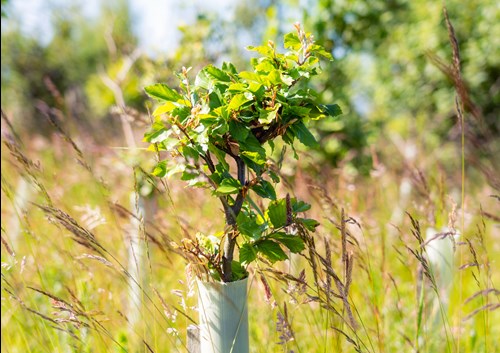Integrated Carbon Farming not all about trees

Woodlands and forests will help meet national sequestration targets, but there are other factors to be considered.
In light of the Scottish Government’s legal commitment to reaching Net zero emissions by 2045, with an interim requirement to reduce agricultural emissions by 31 per cent by 2031, there is increasing reference to, and interest in, ‘carbon farming’. Carbon farming can be defined as implementing practices that are known to improve the rate at which CO2 is sequestered from the atmosphere and converted to plant material and/or soil organic matter. The term ‘carbon farming’ is therefore somewhat of a misnomer, in that the aim is not to farm carbon but to sequester greenhouse gas (GHG) emissions. As a result, as each sector of business and industry strives to meet the stringent targets and timeframes, the interest in carbon farming goes way beyond the farm gate.
Given the extensive and ongoing research taking place on a global scale, the importance and desirability of carbon farming in terms of sequestering greenhouse gases (GHG) is not up for debate. However, from a Scottish perspective, it is important to ensure that, with the advent of ‘carbon credits’ (One credit permits the emission of one ton of carbon dioxide or the equivalent in other greenhouse gases), carbon farming does not allow non-agricultural sectors to continue polluting the atmosphere while using farmers to compensate their emissions.
Carbon farming activities include agroforestry, afforestation, peatland restoration and changes to soil organic carbon.
The planting of more woodlands and forests will help to meet national sequestration targets and, through the creation of carbon credits, can create new income streams for farms and croft businesses. However, allowing non-agricultural businesses to purchase whole farms to be planted in trees could have significant socio-economic implications for rural communities. As trees need very little human input once established, there could be far reaching implications with regard to rural employment opportunities, thereby potentially accelerating rural depopulation rates, raising the median age in remote rural communities, and increasing the risk of social isolation and mental health issues.
Given that the primary role of Scottish farms and crofts is to produce food, carbon farming should be seen as an opportunity for farmers and crofters to meet GHG emission reduction targets through adopting an Agro-ecological approach to land management. In addition to seeking technical efficiency, surely promoting greater biodiversity and biodiversity friendly practices on each and every estate/farm/croft will have a far greater effect on reducing total emissions than blanket afforestation individual farms/estates bought by large corporations and carbon credit speculators.
From a land management perspective, as highlighted by the DEFRA Agri-climate Report 2021 greenhouse gases can be reduced through the uptake of key on-farm mitigation measures including the use of catch crops, cover crops, conservation tillage, enhancing soil health, reducing soil loss by erosion, enhancing soil organic carbon on arable land, carrying out nutrient budgeting and restoring peatlands and wetlands to reduce oxidation of the existing carbon stock. From a livestock perspective, achieving Key Performance Indicators (KPIs) and efficient grassland management will help to drive down total emissions.
By ascertaining where efficiencies in land use management could be achieved, this could free-up currently under-utilised/ ‘surplus’ land which could then be used to enhance on farm/croft biodiversity, improve countryside access and/or to develop symbiotic carbon farming activities. Coupled with the potential sale of carbon credits, this would strengthen the sustainability of Scottish agriculture from an economic, social, and perspective, thereby achieving a greater good than from carbon farming alone.
Christine Beaton, SAC Consulting
Posted by Christine Beaton on 04/10/2022
